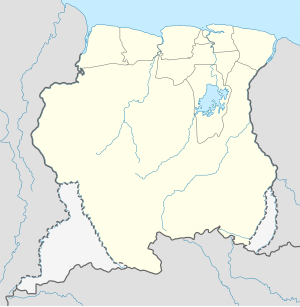Poeloegoedoe
Poeloegoedoe
Pulugudu | |
|---|---|
Village | |
 Drawing of Poeloegoedoe (1890) | |
| Coordinates: 4°21′12″N 54°26′31″W / 4.35333°N 54.44194°W | |
| Country | Suriname |
| District | Sipaliwini District |
| Resort | Tapanahony |
| Time zone | UTC-3 (AST) |
Poeloegoedoe (also: Pulugudu and Pori Gudu[1]) is a village in the Tapanahony River at the confluence with the Lawa River. It is named after the Poeloegoedoe Falls and is inhabited by maroons of the Ndyuka people.[2] The village is located in the Tapanahony resort of Sipaliwini District, Suriname.
History
[edit]The Poeloegoedoe Falls are located at the confluence of the Tapanahony River with the Lawa River after which both rivers continue as the Marowijne River.[3] The hills on the Surinamese and French side constitute a large wall, and the river is squeezed through a 20-metre opening.[4] The word Poeloegoedoe means "takes your possessions" (compare: pull goods).[5]
In 1805, there was a mutiny of the Corps of Black Hunters (Redi Musu) which had been established to protect the colony of Suriname against attacks by maroons.[6] The soldiers moved into the tribal area of the Ndyuka people and reached an agreement. On 3 June 1806, the postholder Kelderman reported that they had settled in Poeloegoedoe and had created gardens for subsistence farming.[7] The location was a strategic choice of the Ndyuka to protect the Tapanahony River against attacks by the Aluku, an enemy maroon people.[8] The soldiers were later integrated into the tribe as one of the los (matrilinear kinship groups).[1][9]
Overview
[edit]Poeloegoedoe is a small village,[1] and does not have a school or clinic.[10] There is a gold concession near the village.[11]
References
[edit]- ^ a b c Groot 1989, p. 11.
- ^ Groot 1989, p. 20.
- ^ "Lawa-exploratie". Het Vaderland (in Dutch). 1 August 1904. Retrieved 14 July 2022.
- ^ "Poeloegoedoe". De West (in Dutch). 17 January 1934. Retrieved 14 July 2022.
- ^ Albert Helman (1980). Het eind van de kaart (in Dutch). Amsterdam: Arbeiderspers. p. 36. ISBN 902951907X.
- ^ Groot 1989, p. 9.
- ^ Groot 1989, p. 10.
- ^ Herman Benjamins & Johannes Snelleman (1917). Encyclopaedie van Nederlandsch West-Indië (in Dutch). Leiden: Martinus Nijhoff Publishers. p. 154.
- ^ Charles Douglas (1930). Een blik in het verleden van Suriname (in Dutch). Paramaribo: Oliviera. p. 12.
- ^ "Planning Office Suriname - Districts" (PDF). Planning Office Suriname (in Dutch). 2015. p. 171. Retrieved 14 July 2022.
- ^ "Braziliaanse roversbende actief in Tapahony-gebied". GFC Nieuws (in Dutch). 2 February 2012. Retrieved 14 July 2022.
Bibliography
[edit]- Groot, Silvia de (1989). "Het Korps Zwarte Jagers in Suriname collaboratie en opstand II". OSO. Tijdschrift voor Surinaamse Taalkunde, Letterkunde en Geschiedenis (in Dutch). Vol. 8.

